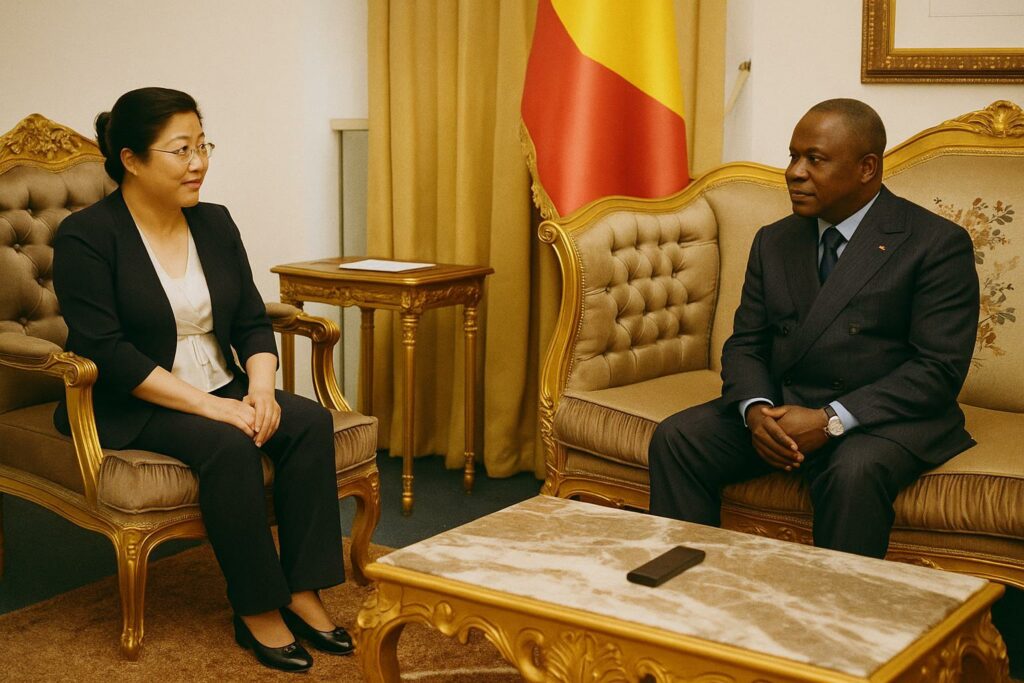A Ritual of Courtesies with Geostrategic Resonance
The marble corridors of the Congolese Upper House rarely host diplomatic novelties, yet the arrival of Ambassador An Qing on 3 July felt palpably different. Barely four days after presenting her letters of credence, she stepped into Senate President Pierre Ngolo’s office accompanied by a carefully curated delegation. The conversation, officially centred on “institutional and legislative cooperation”, unfolded against a broader tableau: Brazzaville’s search for reliable partners in a shifting international order and Beijing’s quest to consolidate its African partnerships (Xinhua, 2 July 2024).
Speaking to the press, the ambassador underlined an intention to “translate the long-standing political trust between our heads of state into practical results across institutions”. Her vocabulary echoed President Denis Sassou Nguesso’s own formulation of a “strategic and exemplary partnership”, expressed during his 2019 state visit to Beijing, when the two governments elevated their ties to a comprehensive strategic cooperative partnership (People’s Daily, 6 Sept 2019).
Parliamentary Channels as Strategic Vectors
Legislative diplomacy may lack the headline-grabbing appeal of megaprojects, yet it has become a prized instrument for Beijing. Under the aegis of the Chinese People’s Political Consultative Conference and the National People’s Congress, specialised committees have multiplied exchanges with African parliaments. The Congolese Senate already maintains a friendship group with its Chinese counterpart; the new roadmap envisages staff secondments, co-drafting workshops on investment law, and a twinned observatory on climate-friendly legislation. While no formal MoU was signed on Monday, aides confirmed that a draft text is circulating with provisional funding lines earmarked in the 2025 budget proposal of the Congolese legislature.
President Ngolo emphasised the domestic dividend of such cooperation. “The Senate wishes to equip itself with comparative legislative techniques so that our oversight role keeps pace with economic reforms,” he remarked, hinting at forthcoming debates on mining royalties and special economic zones. Analysts in Brazzaville interpret the focus on parliamentary ties as a discreet method of insulating cooperation from day-to-day diplomatic turbulence.
Economic Undercurrents: Beyond the Hemicycle
Although discussions formally revolved around institution-to-institution exchanges, the subtext was unmistakably economic. China now absorbs over 35 percent of Congo-Brazzaville’s crude exports, while Chinese firms—Sinohydro, CITIC Construction and Huawei among them—dominate contracts in road, telecom and hydroelectric infrastructure (African Development Bank, 2023 Country Brief). Debt renegotiations concluded in 2019 under IMF facilitation brought temporary relief, yet they also underscored Beijing’s leverage over Brazzaville’s fiscal breathing space. Against this backdrop, parliamentary cooperation offers a forum to fine-tune the regulatory matrix governing future projects, from the proposed Brazzaville–Ouesso railway to the extension of the Liouesso hydropower plant.
Sources close to the Ministry of Economy suggest that a new financing package for agribusiness corridors in the Cuvette region may be announced during the next mixed commission. Embedding such deals within a legislative framework could bolster transparency—an objective quietly encouraged by development partners in Paris and Washington—while allowing China to project the image of a responsible stakeholder.
Human Capital and Cultural Bridges
No less strategic is the cultural dimension. Forty Congolese students are scheduled to depart for Wuhan and Chengdu this September under refreshed scholarship quotas, a 30 percent increase over last year. According to the Congolese Ministry of Higher Education, the engineering and public-health tracks were prioritised at the explicit request of the Senate leadership, which is keen to align human-capital formation with the National Development Plan 2022-2026.
Ambassador An Qing disclosed that plans are afoot to open a second Confucius Institute in Pointe-Noire. The initiative dovetails with Beijing’s soft-power doctrine, yet it also serves a pragmatic purpose: refining the linguistic skills of a growing pool of Congolese technicians employed by Chinese contractors in the oil and timber sectors. A senior official at the Embassy noted that cultural proximity can “smooth contractual frictions that are inevitable in complex infrastructure undertakings.”
Strategic Implications for Central Africa’s Diplomatic Chessboard
Brazzaville’s renewed courtship of Beijing occurs as multilateral alignments in Central Africa undergo subtle recalibration. Chad’s rapprochement with Qatar, Gabon’s transition process, and the Democratic Republic of Congo’s deepening ties with the United States have generated a fluid environment. Within this mosaic, Congo-Brazzaville emphasises continuity. President Sassou Nguesso’s administration has consistently portrayed its relationship with China as complementary rather than exclusionary, positioning the Republic as an ‘equidistant interlocutor’ capable of engaging with Washington, Brussels and Moscow in parallel.
Regional diplomats view the current parliamentary overture as a low-risk, high-yield manoeuvre. It offers Brazzaville an arena to modernise governance practices while avoiding public controversies associated with resource-backed loans. For Beijing, the initiative provides durable access to a reliable partner astride the Congo River basin, an area critical to its broader Belt and Road extension towards the Atlantic seaboard.
Measured Optimism Wrapped in Procedural Formality
Both parties are keenly aware that relationship management thrives on symbolism as much as substance. The carefully choreographed handshake between Mr. Ngolo and Ambassador An, captured by state television and subsequently replayed on Chinese social media, projects an image of serene continuity. Yet the success of the new roadmap will hinge on pragmatic deliverables: timely disbursement of project funds, legal clarity on public-private partnerships, and tangible improvements in legislative capacity.
Still, diplomats consulted in Brazzaville express guarded optimism. A senior official at the Congolese Ministry of Foreign Affairs observed that “the conversation has moved from macro-statements about friendship to granular discussions on drafting, oversight and evaluation. That is where cooperation becomes irreversible.” Should those granular discussions consolidate into binding protocols over the coming year, the Senate’s brief meeting may well be remembered as the quiet moment when Sino-Congolese harmony indeed received its latest upgrade.

